Ford Transit Bus VS Peugeot 308 – Specs, Efficiency & Price Comparison
Which model is the better choice – the Ford Transit Bus or the Peugeot 308? We compare performance (150 HP vs 180 HP), boot capacity (0 L vs 412 L), efficiency (9.40 L vs 15.60 kWh1.30 L), and of course, the price (50500 £ vs 28600 £).
Find out now which car fits your needs better!
The Ford Transit Bus (Bus) is powered by a Diesel engine and comes with a Automatic transmission. In comparison, the Peugeot 308 (Hatchback) features a Diesel, Plugin Hybrid, Electric or Petrol MHEV engine and a Automatic gearbox.
When it comes to boot capacity, the Ford Transit Bus offers 0 L, while the Peugeot 308 provides 412 L – depending on what matters most to you. If you’re looking for more power, you’ll need to decide whether the 150 HP of the Ford Transit Bus or the 180 HP of the Peugeot 308 suits your needs better.
There are also differences in efficiency: 9.40 L vs 15.60 kWh1.30 L. In terms of price, the Ford Transit Bus starts at 50500 £, while the Peugeot 308 is available from 28600 £.
Compare all the key specs now and find out which model fits your lifestyle best!
Ford Transit Bus
The Ford Transit Bus is renowned for its robust performance and spacious interior, making it an ideal choice for both commercial and personal use. With its efficient handling and modern design, it effortlessly combines practicality with comfort. Its adaptability and versatility ensure it meets the demands of various driving needs, from urban transport to long-distance journeys.
details @ media.ford.com
@ media.ford.com
 @ media.ford.com
@ media.ford.com
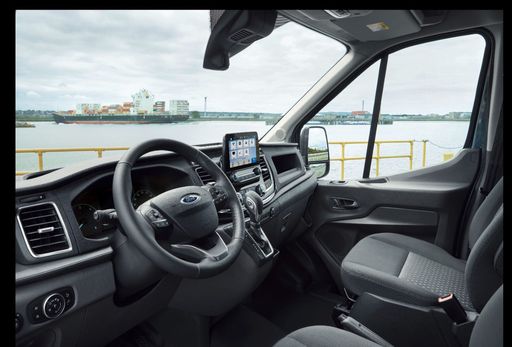 @ media.ford.com
@ media.ford.com
Peugeot 308
The Peugeot 308 presents a refined blend of style and sophistication, making it a compelling option for anyone in search of a dynamic yet practical vehicle. Its sleek design is complemented by a thoughtfully crafted interior that ensures both driver and passengers travel in comfort and elegance. Moreover, the 308 offers a responsive driving experience, combining agility with a sense of security on the road.
details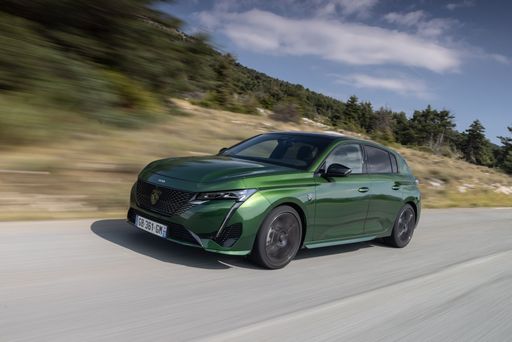 @ media.stellantis.com
@ media.stellantis.com
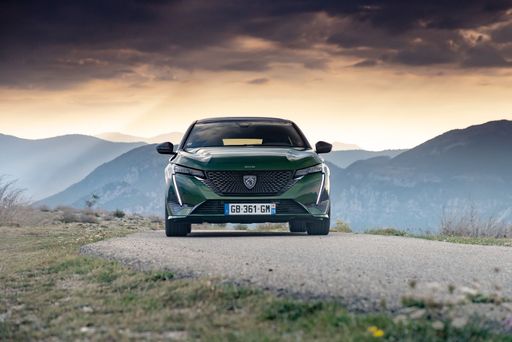 @ media.stellantis.com
@ media.stellantis.com
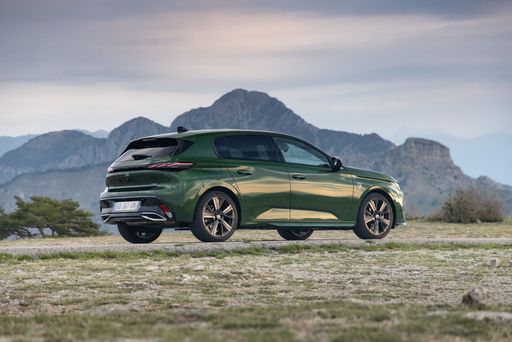 @ media.stellantis.com
@ media.stellantis.com
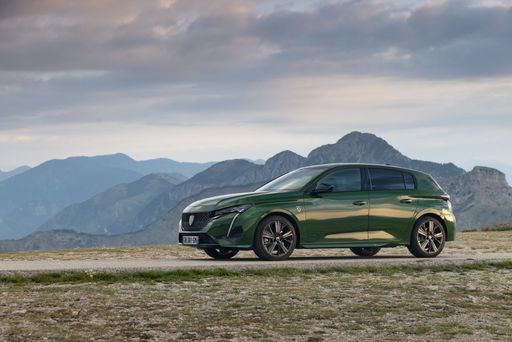 @ media.stellantis.com
@ media.stellantis.com
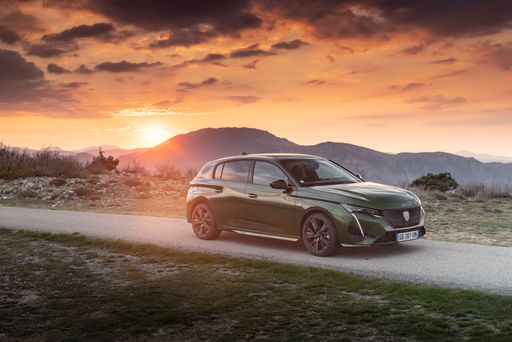 @ media.stellantis.com
@ media.stellantis.com
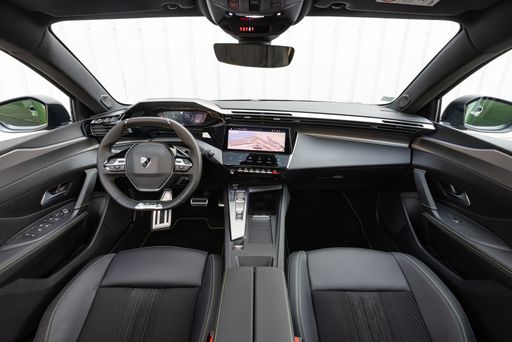 @ media.stellantis.com
@ media.stellantis.com

|

|
|
|
|
Costs and Consumption |
|
|---|---|
|
Price
50500 - 52900 £
|
Price
28600 - 41700 £
|
|
Consumption L/100km
9.4 - 9.5 L
|
Consumption L/100km
1.3 - 5.1 L
|
|
Consumption kWh/100km
-
|
Consumption kWh/100km
15.60 kWh
|
|
Electric Range
-
|
Electric Range
57 - 419 km
|
|
Battery Capacity
-
|
Battery Capacity
11.3 - 51 kWh
|
|
co2
245 - 248 g/km
|
co2
0 - 133 g/km
|
|
Fuel tank capacity
70 L
|
Fuel tank capacity
40 - 53 L
|
Dimensions and Body |
|
|---|---|
|
Body Type
Bus
|
Body Type
Hatchback
|
|
Seats
9
|
Seats
5
|
|
Doors
4
|
Doors
5
|
|
Curb weight
2338 - 2385 kg
|
Curb weight
1436 - 1759 kg
|
|
Trunk capacity
0 L
|
Trunk capacity
361 - 412 L
|
|
Length
5531 - 5981 mm
|
Length
4367 mm
|
|
Width
2059 mm
|
Width
1852 mm
|
|
Height
2530 - 2533 mm
|
Height
1441 mm
|
|
Payload
1115 - 1162 kg
|
Payload
431 - 510 kg
|
Engine and Performance |
|
|---|---|
|
Engine Type
Diesel
|
Engine Type
Diesel, Plugin Hybrid, Electric, Petrol MHEV
|
|
Transmission
Automatic
|
Transmission
Automatic
|
|
Transmission Detail
Automatikgetriebe
|
Transmission Detail
Automatikgetriebe, Automat. Schaltgetriebe (Doppelkupplung)
|
|
Drive Type
Front-Wheel Drive
|
Drive Type
Front-Wheel Drive
|
|
Power HP
130 - 150 HP
|
Power HP
130 - 180 HP
|
|
Acceleration 0-100km/h
-
|
Acceleration 0-100km/h
7.6 - 10.6 s
|
|
Max Speed
-
|
Max Speed
170 - 225 km/h
|
|
Torque
360 - 390 Nm
|
Torque
230 - 360 Nm
|
|
Number of Cylinders
4
|
Number of Cylinders
3 - 4
|
|
Power kW
96 - 110 kW
|
Power kW
96 - 133 kW
|
|
Engine capacity
1995 cm3
|
Engine capacity
1199 - 1598 cm3
|
General |
|
|---|---|
|
Model Year
2024
|
Model Year
2023 - 2025
|
|
CO2 Efficiency Class
G
|
CO2 Efficiency Class
D, B, A, C
|
|
Brand
Ford
|
Brand
Peugeot
|
Ford Transit Bus
The Versatile Ford Transit Bus from Ford
The Ford Transit Bus has always been a leader in the category of commercial passenger vehicles, and the 2024 model continues this legacy with a blend of reliability, innovation and modern design. With a range of configurations, the Ford Transit Bus is aimed at meeting the needs of businesses and individuals who require a spacious, dependable mode of transport.
Under the Bonnet: Technical Mastery
Power comes from a 2.0 EcoBlue diesel engine, available in power outputs of 130 and 150 PS. The engine is combined with an automatic transmission, ensuring a smooth drive even when fully laden. This Euro 6 compliant powerplant is designed for efficiency without sacrificing performance, sporting a fuel consumption range of 9.4 to 9.5 L/100km and an associated CO2 output of 245 to 248 g/km. Such numbers ensure that the Ford Transit Bus strikes a balance between power and economy.
Room to Spare: Exceptional Capacity and Comfort
The Ford Transit Bus is not just about getting from A to B; it’s about transporting passengers with utmost comfort. Depending on the specifications, the bus can accommodate between eight to nine passengers. The spacious interior is accompanied by an array of comfort features under the ‘Trend Automatik’ trim level, offering a practical and enjoyable ride experience for both drivers and passengers alike.
Dimensions and Practicality
Designed with practicality in mind, the Ford Transit Bus boasts dimensions that are fully suited to a variety of professional needs. Its length ranges from 5531 to 5981 mm, with a consistent width of 2059 mm and a height range from 2530 to 2533 mm. This translates to a generous loading capacity with a payload ranging from 789 to 1162 kg, making it a versatile option for businesses requiring ample cargo space alongside passenger accommodation.
Advanced Technology for Modern Roads
Aside from its primary function as a people mover, the Ford Transit Bus also shines with its technological prowess. It integrates advanced driver assistance systems aimed at ensuring both active and passive safety. This includes features that help drivers navigate through complex traffic situations and ensure maximum safety for all passengers.
A Smart Investment
The Ford Transit Bus is a competitive contender in its segment, offering not just performance and reliability but also reasonable costing. With monthly running costs ranging from €1,654 to €1,730 and cost per kilometre between 66.2 and 69.2 cents, businesses can expect an affordable operation without unexpected hikes in upkeep costs.
In conclusion, the Ford Transit Bus remains a clear front-runner among its peers, offering a combination of cutting-edge technology, impressive fuel efficiency, and a spacious, comfortable interior. Whether you are looking to enhance your fleet or need a robust transport solution, the Ford Transit Bus is a sound choice for the discerning buyer in 2024.
Peugeot 308
Unveiling the Peugeot 308: A Blend of Style and Innovation
The Peugeot 308, an exemplar of French automotive engineering, brings together sleek design, advanced technology, and efficient performance. This hatchback caters to a diverse range of drivers, from eco-conscious individuals to those seeking a spirited driving experience. Let’s delve into the technical details and innovative features that define the Peugeot 308.
Powertrain Options: From Conventional to Cutting Edge
The Peugeot 308 offers an impressive array of powertrains to suit varying preferences and needs. Whether you opt for a traditional petrol, a fuel-efficient diesel, a sophisticated plug-in hybrid, or the fully electric variant, the 308 ensures an engaging drive. Petrol and diesel engines offer power outputs ranging from 130 to 130 PS, catering to both urban commutes and highway drives. The plug-in hybrid variants, boasting up to 225 PS, promise a seamless blend of power and efficiency, with an electric-only range of up to 57 km, perfect for city driving.
Engineering and Efficiency: Striking a Balance
The engineering marvel lies in the Peugeot 308's commitment to efficiency without compromising on performance. The fuel economy stands out, with consumption figures between 1.3 L/100km for plug-in hybrids and 5.9 L/100km for petrol engines. The electric version showcases an impressive 15.6 kWh/100km, allowing an electric range of 419 km, making it a viable option for those looking to reduce their carbon footprint.
Anatomy of Design: Sleek and Functional
Peugeot’s design philosophy shines through in the 308, with a captivating combination of elegance and practicality. Its dimensions - 4367mm in length, 1852mm in width, and 1441mm in height - create a spacious yet maneuverable vehicle. The five-door hatchback accommodates up to five passengers, offering a comfortable journey while boasting a boot space of 361 to 412 litres.
Technological Innovations and Features
The 308's cabin is a testament to Peugeot's commitment to innovation. It features an intuitive digital i-Cockpit, offering a more engaging driving interface with a configurable 10-inch digital cluster and a high-definition central touchscreen. Advanced driver assistance systems ensure safety and convenience, including adaptive cruise control, lane-keeping assist, and automated emergency braking, which elevate the driving experience.
Performance and Dynamics: Designed for the Enthusiast
Performance in the Peugeot 308 is not merely a promise but a reality, with acceleration from 0-100 km/h achieved in 7.5 to 10.6 seconds depending on the model. The dynamic chassis ensures a stable and responsive driving experience, while the range of gearbox options, including a smooth automatic and a manual transmission, cater to different driving styles.
Conclusion: The Allure of the Peugeot 308
The Peugeot 308 epitomises the blend of style, efficiency, and innovation. It offers a diverse range of powertrain options, ensuring that there’s a 308 for every kind of driver. Whether you're drawn to its design, captivated by its technology, or impressed by its efficiency, the 308 stands as a testament to Peugeot's evolution in the modern automotive landscape.
The prices and data displayed are estimates based on German list prices and may vary by country. This information is not legally binding.
